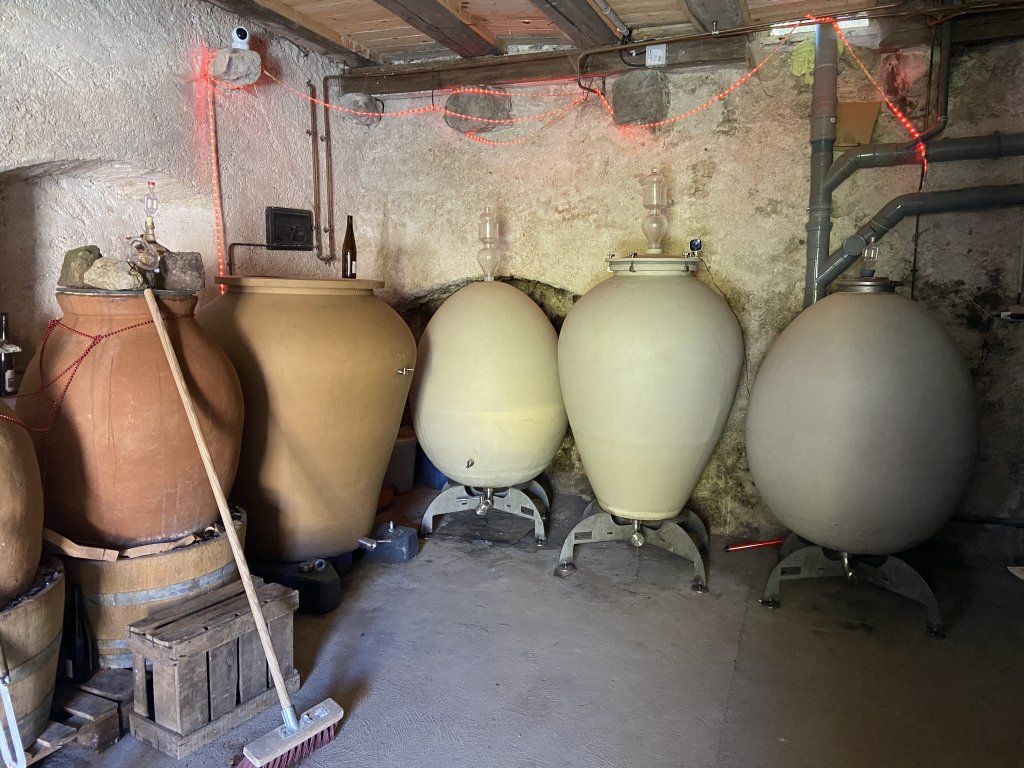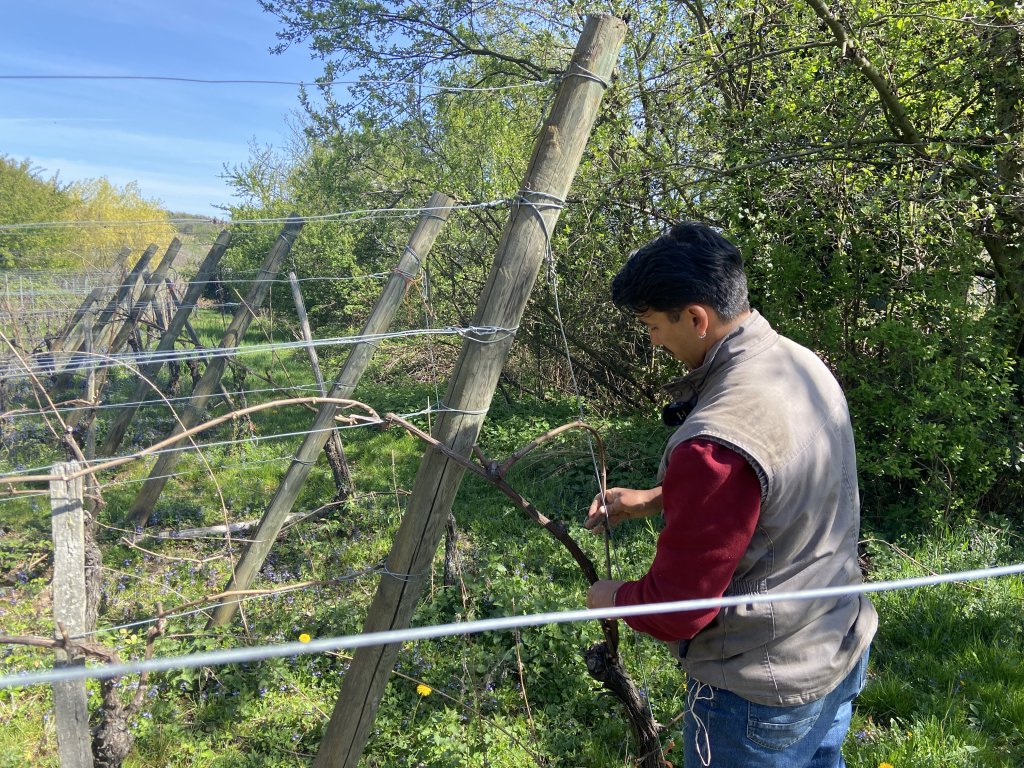InfoMigrants met migrants who found their path to fulfillment through agriculture. Haroon Rahimi was born in Afghanistan, where alcohol is banned. Today, the refugee -- now living in France and working as a winegrower in Alsace -- has developed a passion for natural wines. This is part one of our series "Integration through Agriculture".
"Sorry for the mess in the car, it’s a farmer’s car,” said Haroon Rahimi as he got behind the wheel of his red truck. The floor was covered in dry dirt, and the passenger compartment was filled with items typical of a work vehicle: a lost pen, a misplaced tool.
After a short drive by someone who doesn’t have a moment to spare, the car arrived in Niedermorschwihr. The Alsatian vineyard was already bathed in sunshine on this early April day. On the hills surrounding the village of just over 400 inhabitants, located seven kilometers from Colmar, the buds of vine leaves had only just begun to emerge.
Born in a country where alcohol is banned, Haroon Rahimi, 27, created the Harjane domain (“All the souls” in French) in 2023. Over a stretch of two hectares, divided between Niedermorschwihr and a neighboring village, he cultivates grape varieties typical of Alsace: White pinot noir, Gewurztraminer and Riesling.
Read AlsoItaly: 24 migrants receive training on Brunello wine in Montalcino
Wine made in a plastic bucket
This uncharacteristic winegrower's history in France began in 2016. The Taliban were still far from the Afghan capital, but the climate in the country was becoming increasingly violent, with civilians paying the price of bombings perpetrated by the Taliban and the local branch of the Islamic State. The UN counted some 11,500 civilian victims that year.
Rahimi lived in Kabul with the family of his mother, whose youngest brother Naweed is his age. Both boys were the target of threats because they came from an educated and occidentalized family. To flee this environment, they filed for long-stay visas with the objective of obtaining asylum from the French Embassy. They arrived in France in March 2016 after obtaining their visas and resumed their studies.
Ramini began attending a vocational high school for catering and hospitality. He soon discovered the profession of sommelier and the world of wine in the restaurants where he worked while preparing for his diploma. "The first time I tasted wine was in Afghanistan, at the home of my mother's friend who had vinified his grapes in a plastic bucket. It was delicious, and I never tasted anything similar again," he said.
As the months went by, the Afghan realized he didn't want to serve wine, but produce it. "I wanted to make people dream and travel by making my own wines," said the young man.
‘The energy of someone who wanted to suceed’
Rahimi later pursued a vocational Baccalauréat (Bac professionnel) in "Viticulture and Oenology" in Perpignan and an advanced vocational training certificate (BTS) in viticulture at Rouffach, in Alsace. "I'm passionate about biodynamics and natural wines, and I saw this was a region where this was more widespread than anywhere else in France," said the young man, explaining his decision to settle in the region.
A purist at heart, Haroon Rahimi strives to cultivate his wines without pesticides or insecticides. He also tries to vinify them with the smallest possible amount of added sulfites. The young man's interest in organic farming stemmed from his desire to rediscover the taste of the foods of his native Afghanistan. "Organic farming doesn't exist there, but everything is grown naturally," he said.
While training for his advanced vocational training certificate (BTS), Haroon alternated between schooling in Rouffach and an apprenticeship on Stéphane Bannwarth's farm. The 58-year-old winemaker, based in the village of Obermorschwihr, is passionate about sharing his knowledge. Yet after several negative experiences with apprentices, he was hesitant to try it again.
"Experience shows that it's not necessarily people who have worked in the wine world who make the best candidates. When I met Haroon, I felt the energy of someone who wanted to get involved," said Bannwarth.

The young Afghan completed his winemaking training at the family estate in Obermorschwihr, learning how to make wine in terracotta jars, a technique he still practices today. Bannwarth, for his part, discovered Rahimi's qualities as a winemaker: "Tenacity, open-mindedness, resourcefulness", and resilience to the Alsatian weather.
‘When I have an idea in mind, I go for it’
The relationship between the teacher and apprentice was not always an easy one. The young Afghan is "stubborn", said his teacher. "Haroon tends to think that those who don't do the same as him are wrong. I had to fight to make him understand that all opinions must be respected," said Bannwart.
Rahimi doesn't deny it. "When I have an idea in mind, I go for it. I don't see anything else. I've been criticized for this a lot, but it's also why I'm here today. I’ve stayed true to my convictions," he said.
Stéphane Bannwarth also mentioned "complications" linked to the authority of his colleagues, on the farm where he works with his wife, his sister, and a female employee. "I had the impression that it was difficult for him to accept orders from a woman," he said.
Rahimi admitted to some frictions, but he said they took place because of his character. “I took a lot of initiatives [. . .] and it was taken badly. But it’s not at all a question linked to women,” he said. “It’s also thanks to these women that I am here and that we continue collaborating in good spirits.”
The ties between Rahimi and his teacher have stayed strong. The Afghan vinified his first batch of wine with Bannwarth and still rents some of his vineyards. His teacher continues giving him advice: “ From what I have tasted [among the wines of Haroo], there are things that succeed well. For others, I think we can improve them.”
‘All the souls’.. and all the struggles
Bannwarth decided by the end of Rahimi's apprenticeship that it would be good for the young Afghan to continue gaining experience with other establishments. Which is exactly what he did. After several employment experiences in the region, Rahimi found vineyards to rent in Niedermorschwihr, thus creating in 2023 the Harjane domain.
The young winegrower discovered all the difficulties of creating a business along with the financial risks. He needed to borrow money to create the domain. Two years later, his list of clients is growing, but the Afghan still cannot pay himself a salary.

The young man will be harvesting his second grape crop in September. He hopes to hire both French workers and refugees to help pick the grapes, as he did last fall. Yet he remains apprehensive about the challenges ahead. "In 2024, I hired people through the Raisin application and was also put in touch with refugees who wanted to come and help with the harvest. But the Colmar prefecture and the agricultural mutual insurance company caused me a lot of problems hiring them," said the winemaker, who advocates for the creation of an "[adminstrative] committe for refugees [involved in] the grape harvest."
For the moment, it's simply time to tie the vines. Rahimi positioned the branches of each vine horizontally on a wire to make them grow straight. The task was tedious, and the winemaker acknowledged that he often chooses more restrictive working methods than his peers. "All my colleagues tell me, 'You're crazy to do it like that,'" he said. "The problem with me is that I can't do it like everyone else. While others do things well, I have to make mistakes to learn."
